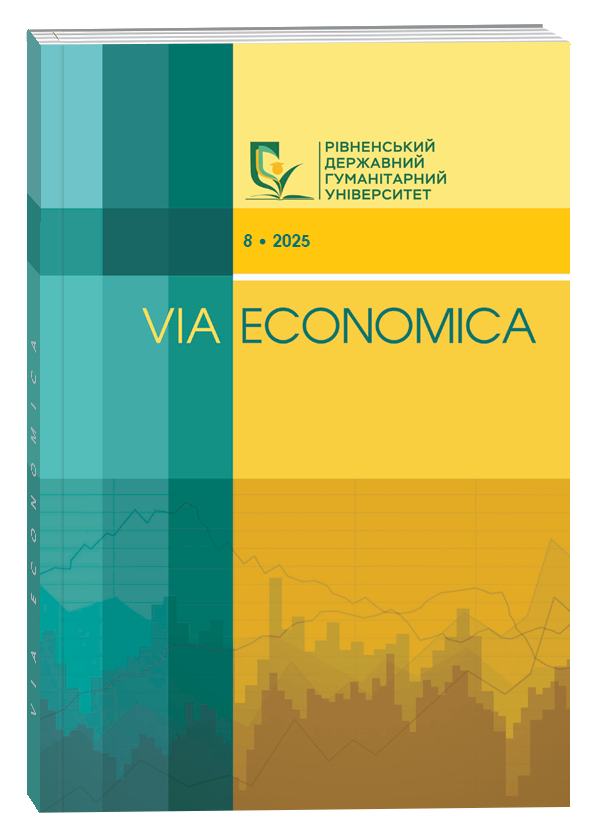ARTIFICIAL INTELLIGENCE IN MANAGING THE EFFICIENCY OF HIGHER EDUCATION INSTITUTIONS
Abstract
The article presents a comprehensive analysis of the impact of artificial intelligence (AI) on the transformation of educational processes and the management of higher education institutions' (HEIs) performance. Using SWOT and PESTLE methodologies, the study identifies key strengths of AI implementation, such as learning personalization, optimization of administrative tasks, promotion of academic integrity, and enhancement of inclusive education. At the same time, significant challenges are revealed, including ethical concerns, data security risks, financial constraints, and the insufficient digital readiness of educational staff. The article substantiates the need for regulatory frameworks governing AI use in education, the development of digital literacy among faculty and students, and international donor support for technological innovation in HEIs. Practical recommendations are proposed, outlining phased steps for AI integration: staff training, modernization of technical infrastructure, establishment of ethical standards, adaptation of educational programs, and the creation of inclusive digital environments. The study concludes that effective integration of AI can not only improve educational quality but also boost the global competitiveness of Ukrainian higher education. The findings are of practical relevance for HEI administrators, policymakers, researchers, and educators seeking to navigate the challenges and opportunities of digitalization. Future research directions may include empirical analysis of AI's influence on student academic performance, assessment of the economic efficiency of AI integration, and development of ethical and secure models for the application of intelligent systems in higher education.
References
Reynolds, M. Hospitality Labor Laws. Chron. URL: https://smallbusiness.chron.com/hospitality-labor-laws-65813.html
Паламар С., Науменко М. Штучний інтелект в освіті: проблеми академічної доброчесності. Освітній дискурс. 2024. № 10. С. 47–58.
Наливайко О. Перспективи використання нейронних мереж у вищій освіті в Україні. Інформаційні технології та засоби навчання. 2023. № 1. С. 29–37.
Kozij, N., & Melnychuk, G. Artificial Intelligence in Educational Processes: International Practices. Tax University, 2024.
Neumann, M., Rauschenberger, M., & Schön, E. ChatGPT and the Future of AI in Higher Education. IEEE, 2023.
Michel-Villarreal, R. Challenges and Opportunities of Generative AI in Education. Education Sciences. 2023. Vol. 13, Issue 5, pp. 151–160.
Панухник О. Штучний інтелект у віртуальному і доповненому навчанні. Журнал освітніх технологій. 2023. № 7. С. 202–211.
Clarke, J. AI and Higher Education: Economic and Social Impacts. Cambridge University Press, 2022, 215 p.
Jackson, D. Ethical Governance in AI-Based Education Systems. Global Standards Journal. 2023. Vol. 5, No. 4, pp. 33–48.
Кравченко Н. Подолання бар’єрів у впровадженні ШІ в університетах. Український журнал освіти. 2024. № 8. С. 129–138.
Доценко С. Оптимізація освітніх процесів через ШІ у вищій освіті. Молодь і ринок. 2024. № 12. С. 15–22.
Reynolds, M. Using AI to Enhance Accessibility in Education. Accessibility Science. 2023. Vol. 9, No. 2, pp. 85–95.
Reynolds, M. Hospitality Labor Laws. Chron. URL: https://smallbusiness.chron.com/hospitality-labor-laws-65813.html
Palamar S., Naumenko M. (2024). Shtuchnyi intelekt v osviti: problemy akademichnoi dobrochesnosti. Osvitnii dyskurs. № 10. S. 47–58.
Nalyvaiko O. (2023). Perspektyvy vykorystannia neironnykh merezh u vyshchii osviti v Ukraini. Informatsiini tekhnolohii ta zasoby navchannia. № 1. S. 29–37.
Kozij, N., & Melnychuk, G. Artificial Intelligence in Educational Processes: International Practices. Tax University, 2024.
Neumann, M., Rauschenberger, M., & Schön, E. (2023). ChatGPT and the Future of AI in Higher Education. IEEE.
Michel-Villarreal, R. (2023) Challenges and Opportunities of Generative AI in Education. Education Sciences, Vol. 13, Issue 5, pp. 151–160.
Panukhnyk O. (2023). Shtuchnyi intelekt u virtualnomu i dopovnenomu navchanni. Zhurnal osvitnikh tekhnolohii. № 7. S. 202–211.
Clarke, J. (2022). AI and Higher Education: Economic and Social Impacts. Cambridge University Press, 215 p.
Jackson, D. (2023). Ethical Governance in AI-Based Education Systems. Global Standards Journal. Vol. 5, No. 4, pp. 33–48.
Kravchenko N. (2024). Podolannia barieriv u vprovadzhenni ShI v universytetakh. Ukrainskyi zhurnal osvity. № 8. S. 129–138.
Dotsenko S. (2024). Optymizatsiia osvitnikh protsesiv cherez ShI u vyshchii osviti. Molod i rynok. № 12. S. 15–22.
Reynolds, M. (2023). Using AI to Enhance Accessibility in Education. Accessibility Science. Vol. 9, No. 2, pp. 85–95.


